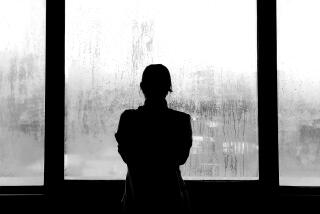Illness in the Elderly Presents Risk for Their Spouses
- Share via
The elderly really can die of a broken heart, not only when their spouses die but even when their spouses are hospitalized.
But such incidents reflect increased stress more than romantic loss, according to the first large study to examine the phenomenon.
Studying the Medicare records of about half a million couples, researchers found that the more burdensome and stressful a spouse’s condition, the more likely their partner would be to die within a year, according to a report today in the New England Journal of Medicine.
The death of a spouse increases a man’s risk of dying in the next year by 21% and a woman’s risk by 17%. Hospitalization of a spouse increases the risk almost as much in the first month, but over the long term by about a quarter of that amount.
“It’s very hard to see someone you love who is sick, it is hard to care for them, and it is hard on your health,” said Dr. Nicholas A. Christakis of the Harvard Medical School, one of the lead authors of the study. “People are interconnected, and their health is too.”
The study is the first quantification of a phenomenon that doctors and those who care for the elderly know well.
“Anecdotally, we do see that a lot, especially in people who have been married 50 or 60 years,” said Rabbi Carla Howard, director of the Jewish Hospice Project in Los Angeles.
It is most common in spouses where their identity as part of a couple overwhelms their individual identity, she said, and is particularly prominent when there are no children and no extended family.
“They will often say, ‘I have no one else to live for, he or she was my only resource,’ ” Howard said.
Christakis and sociologist Paul D. Allison of the University of Pennsylvania studied 518,240 couples with a mean age of 75 for the men and 72 for the women. The couples were tracked for nine years.
Previous studies have shown that the illness of a spouse affects their partner’s health. Christakis and Allison wanted to see if a spouse’s illness had an even more serious effect, increasing the risk of dying.
Men proved to be at the greatest risk from the so-called widower effect or caregiver burden.
If their wives were hospitalized for dementia, about 8.9% of men died within a year, compared with the normal rate of about 6.4% per year. For psychiatric illnesses, about 7.5% died; for stroke, about 6.9%.
But if the wife was hospitalized for colon or several other types of cancer, the husband’s death rate did not increase. The researchers suspected the reason was the long periods of good health that cancer patients can experience.
For women, the rates were slightly lower.
When a spouse was hospitalized, they found, the partner’s risk of dying increased significantly for a month or so, then slowly declined before rising again after six months or more.
Older men and poorer women seem to be the most vulnerable.
The causes of death included heart attacks, suicides, inattentiveness, accidents and infections, Christakis said.
The study didn’t examine the reasons for the increased risk, but many are obvious, experts said.
“The death of a spouse is the most significant stressor anyone can have,” said Dr. Mary Harward, a geriatrics specialist at St. Joseph Hospital in Orange.
“And given the population we deal with, the death of a spouse is fairly common.”
Dr. Suzanne Solomon of Beth Israel Deaconess Medical Center in Boston said couples who have lived together for many years complement each other.
“One may handle the checkbook, one may drive, and so forth,” she said.
If you are 40 when your spouse dies, it is possible to learn to take over those tasks, Solomon said. But when you are in your 70s or older, it is much more stressful.
Many bereaved partners increase harmful behaviors, such as drinking, Christakis said. Others simply stop taking care of themselves.
“Often, they won’t keep [physician’s] appointments for themselves, they won’t take their medications, they won’t attend to basic health maintenance or do the things they need to do to stay healthy,” Harward said.
And with psychiatric diseases and dementia, there is an increased problem because the person they knew is gone even though their body lives on, Rabbi Howard said.
“They grieve two times -- once for the loss of the partner they knew,” she said, “and then, when the partner dies, they go through it all again.”
Why men suffer more from the loss of a spouse is really not clear, the researchers said. Much sociological research, however, shows that men derive a greater benefit than women from being married, and that might play a crucial role.
Moreover, Solomon said, women usually tend to be more outgoing, to be the social organizers for a couple. “If she is in the hospital, the man is more likely to be sitting home alone by himself.”
The message from the study, Christakis said, is that “physicians really need to pay as much attention to the spouse as to the sick person, and anticipate the problems that can occur.”
Doctors may also need to alter their treatment patterns.
Many physicians, for example, are reluctant to perform hip replacements in the elderly because they do not think the benefits are high enough, he said.
But the new findings indicate that hip replacements could also benefit the spouse’s health, and that may be enough to tip the scales in favor of the procedure.






